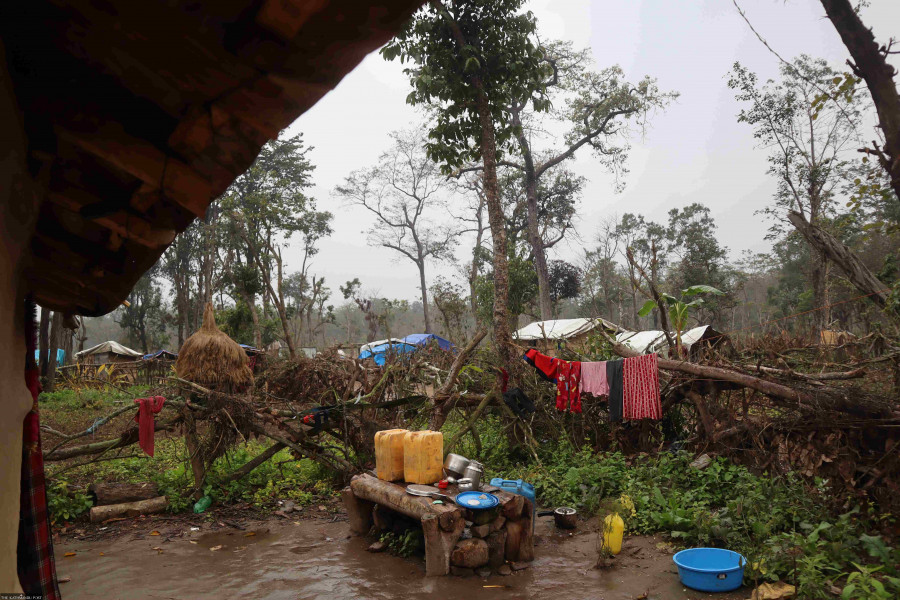
Over 200 families displaced by last year’s landslide have set up camps inside the community forest in Chaumala, Kailali. Mohan Budhaair/TKP
Encroachment of forest areas in Kailali and Kanchanpur districts of Sudurpaschim Province has posed challenges in the conservation of traditionally and scientifically preserved forests.
Land mafias and timber smugglers claiming stakes on the forest resources has led to the shrinking of forest cover in these two districts.
Laljhadi forest, which spreads from the Mohana river of Kailali district to Banahara river of Kanchanpur district, has been shrinking due to rampant deforestation and human encroachment.
The forest, traditionally preserved by the Ranatharu community, is being gradually encroached by human settlements, affecting not just its ecology but also the survival of the wildlife.
“On average, around 30 sal trees are cut down on a daily basis in Laljhadi forest. Our forefathers preserved the forest for us but we haven’t been able to protect it for the future generation,” said Sewaya Rana, a resident of Laljhadi. “The forest cannot be saved when the forest employees and the office bearers of the forest users’ group themselves are involved in timber smuggling.”
Laljhadi is an important part of the Mohana-Laljhadi biological corridor linking Dudhwa National Park of India. The traditional route is regularly used by elephants and tigers.
However, human settlements have been eating into the forest area, intruding upon the bio corridor, and this has inadvertently resulted in human-wildlife conflict.
“Settlements have mushroomed along the bio corridor of the forest area. Herds of wild elephants who have been using the route for decades now suddenly find themselves in the middle of human settlements. This unnerves them and leads to human-wildlife conflict every year,” said Shiva Dutta Panta, chairman of community forest coordination committee, a network of community forests in Laljhadi.
There are 68 community forests in the Mohana-Laljhadi corridor.
According to Panta, the Sisne area in Laljhadi used to be frequented by indigenous elephants until three decades ago but now such elephants are not to be found there.
“The movement of other elephants has also died down in recent years. The elephants come to the area only twice a year now—in July-August and in January-February,” said Panta.
Rampant deforestation took place in the 1990s when Laljhadi was a national forest, say local residents. The forest was then handed over to the local communities and segregated into community forests for better management but deforestation remained unchecked.
The local people claim that felling down of trees and smuggling of timber are still ongoing because forest employees and office bearers of the community forest users' group engage in illegal activities.
The forest officials, however, deny deforestation in the Laljhadi area and their involvement in it.
“We are unaware of any deforestation in the Laljhadi area. The local Tharu community uses the forest for firewood and they take dry branches and twigs,” said ranger Karunakar Joshi, the chief at the Sub-division Forest Office in Laljhadi. “Hardly anybody else enters the forest,” Joshi, who has been working in the sub-division office for the past two years, told the post.
The division forest office in Kanchanpur, however, admits that more than 30 hectares of forest land have been encroached upon in Bailkunthi, Bhetghatshibir and Kumgada areas.
Laljhadi forest spreads across 29,641 hectares of land in Kanchanpur.
Landless people, freed Kamaiyas (bonded labourers), freed Haliyas (ploughmen) and the victims of floods and natural disasters have been encroaching the forest area in Laljhadi, as the government has failed to resettle them.
“The forest is now providing shelter to the poor and displaced people. But it is important to resettle them elsewhere because the forest resources are depleting,” said Siddaraj Ojha, a civil society leader in Kanchanpur.
The federal and provincial governments release a budget each year for the conservation of Laljhadi forest. And the community forests also spend their budget for forest conservation. The federal government has allocated Rs 1 million budget to conserve Laljhadi forest in the current fiscal year.
The budget is mobilised by the Laljhadi Forest Council. For the current fiscal year, the council has decided to spend Rs 500,000 for sapling plantation in the forest while Rs 500,000 has been allocated for the overall conservation of the forest and its wetland areas.
In Chamaula of Gauriganga Municipality in Kailali, the local community forest is facing a similar problem.
Landslides during last year's monsoons displaced around 200 families from Chure Rural Municipality. Most of the displaced have set up camps inside the community forest in Chaumala after the government failed to relocate them to a suitable location.
The victims have been accused of working in cahoots with land mafias and timber smugglers, helping them clear out forest areas, cut trees and smuggle them from the Chure region.
The displaced families had been removed from the Pashupati Community Forest in Chaumala by the consumers' committee in Chaumala. They then cleared out some areas of the Panruwa Forest in Churephedi and settled there.
Following the landslides, around 100 families, who had been taking shelter at a local school, and their relatives camping along the Bhimdutta Highway, were the first ones to move to Chaumala. Now the number of families in Chaumala has reached 211.
“The displaced families are being used as pawns by land mafias and timber smugglers,” said Assistant Forest Officer Kishor Dhami of the Chumala-based Forest Sub-Division Office. “We have seen forest areas being cleared in places they have been setting camps at.”
Dhami also claimed that over 10 hectares of forest area has been destroyed following the arrival of the displaced families.
“More than 300 families, including the 211 landslide-displaced families, have set up camp inside the forest area and the number is increasing by the day,” said Dhami.
Dhami said that the forest sub-division office lacks the resources to tackle timber smuggling in the forest.
“Due to the lack of resources, both human and technical, we have been unable to remove the settlers from the protected area, monitor the forest area and take action against the smugglers,” said Dhami. “The smugglers may be using the homes of locals and local sawmills to hide the smuggled timber.”
Meanwhile, the settlers inside the forest area claim that they have no information regarding the smuggling of timber from the protected areas.
Landslide survivor Sumitra Devi Karki, who was at a camp set up at Panruwa, lamented that they were first forced out from their ancestral home by frequent landslides and now are being accused of working with smugglers.
Karki claimed that the settlers have only cleared the bushes around the camp and they have not cut down any trees to set up camps inside the forest area.
“We do not know who takes the timber from inside the forest,” said Karki, “Our husbands go to work and most of the time only women and children are inside the camps. We have no idea about any kind of timber smuggling.”
Landslide Survivors’ Struggle Committee Chairman Tikaram Karki claimed that the displaced families do not have ties to the land mafias or timber smugglers.
“We did not come here to occupy the forestland. We came here to draw the government's attention towards our safe and immediate resettlement,” said Tikaram. “The concerned authorities did not pay heed to our hardships for over six months so we had to relocate from the hills to the plains.”
He said that the settlers are ready to move from the forest area if the authorities designate a safe place for them.
“We were asked by the Chure Rural Municipality Chairman to settle in this area,” said Tikaram. “The rural municipality also gave us two water tanks of 2,000 litres each and the provincial government has also allocated a budget for a drinking water pipeline for the camp.”
Meanwhile, Forest Division Officer Keshav Parajuli said that it has been difficult for the forest office to clear the settlers from the forest areas as various government and non-government organisations have been offering help to the displaced as soon as they set up camps inside the protected areas.
“The political parties are supporting the illegal settlement of the displaced in the forest area and they are surely doing this for a vote bank,” said Parajuli. “Over 25 hectares of forest land have been encroached by illegal settlers in Kailali district. We need a commitment from the government if we are to conserve the protected areas.”













